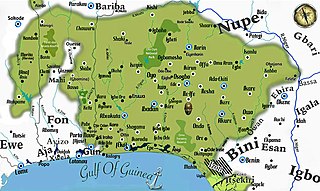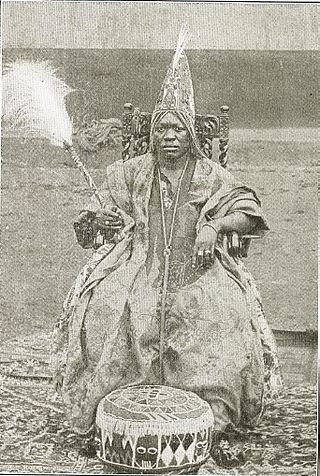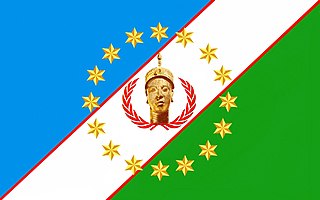Related Research Articles

Oduduwa was a Yoruba divine king, legendary founder of the Ife Empire and a creator deity (orisha) in the Yoruba religion. His earthly origins are from the village of Oke Ora According to tradition, he was the holder of the title of the Olofin of Ile-Ife, the Yoruba holy city. He ruled briefly in Ife, and also served as the progenitor of a number of independent royal dynasties in Yorubaland.

Ifẹ̀ is an ancient Yoruba city in south-western Nigeria, founded in the 6th century. The city is located in present-day Osun State. Ifẹ̀ is about 218 kilometers northeast of Lagos with a population of over 500,000 people, which is the highest in Osun State according to population census of 2006.

Yorubaland is the homeland and cultural region of the Yoruba people in West Africa. It spans the modern-day countries of Nigeria, Togo and Benin, and covers a total land area of 142,114 km2 (54,871 sq mi). Of this land area, 106,016 km2 (74.6%) lies within Nigeria, 18.9% in Benin, and the remaining 6.5% is in Togo. Prior to European colonization, a portion of this area was known as Yoruba country. The geo-cultural space contains an estimated 55 million people, the majority of this population being ethnic Yoruba.

Oba Sir Titus Martins Adesoji Tadeniawo Aderemi, alias Adesoji AderemiKCMG, KBE, was a Nigerian political figure and Yoruba traditional ruler as the Ooni (King) of Ife from 1930 until 1980. He served as the governor of Western Region, Nigeria between 1960 and 1962.

The Oyo Empire was a Yoruba empire in West Africa. It was located in present-day southern Benin and western Nigeria. The empire grew to become the largest Yoruba-speaking state through the organizational and administrative efforts of the Yoruba people, trade, as well as the military use of cavalry. The Oyo Empire was one of the most politically important states in Western Africa from the mid-17th to the late 18th century and held sway not only over most of the other kingdoms in Yorubaland, but also over nearby African states, notably the Fon Kingdom of Dahomey in the modern Republic of Benin on its west.

The culture of Nigeria is shaped by Nigeria's multiple ethnic groups. The country has 527 languages, seven of which are extinct. Nigeria also has over 1,150 dialects and ethnic groups. The three largest ethnic groups are the Hausas that are predominantly in the north, the Yorubas who predominate in the southwest, and the Igbos in the southeast. There are many other ethnic groups with sizeable populations across the different parts of the country. The Kanuri people are located in the northeast part of Nigeria, the Tiv people of north central and the Efik-Ibibio are in the south South. The Bini people are most frequent in the region between Yorubaland and Igboland.

Moremi Ajasoro was a legendary Yoruba queen and folk heroine in the Yorubaland region of present-day southwestern Nigeria who assisted in the liberation of the Yoruba kingdom of Ife from the neighbouring Ugbo Kingdom.
Chief Ògúnwán̄dé "Wán̄dé" Abím̄bọ́lá is a Nigerian academician, a professor of Yoruba language and literature, and a former vice-chancellor of the University of Ife. He has also served as the Majority Leader of the Senate of the Federal Republic of Nigeria. Chief Abimbola was installed as Àwísẹ Awo Àgbàyé in 1981 by the Ooni of Ife on the recommendation of a conclave of Babalawos of Yorubaland.

The documented history begins when Oranyan came to rule the Oyo Empire, which became dominant in the early 17th century. The older traditions of the formerly dominant Ile-Ife kingdom are largely oral.

Old Oyo is the site of the capital city (1400–1835) of the Oyo Empire in what is now modern-day Nigeria. It was a major cultural and political center of West Africa during the empire's height. Established by Yoruba groups migrating from the city of Ile-Ife, the city was the seat of authority for the Alaafin, or custodian/keeper of the palace which was called the Aafin. As capital of a major state during the 17th and 18th centuries, the city is also the site of large markets such as the Akesan market, which was recreated in the later city of New Oyo. Archaeology has been conducted at this site for over four decades. The area designated as Old Oyo is nearly 3,000 hectares. Sites related in cultural relation and importance to the Oyo Empire inclue Koso and Ipapo Ile, both cities in Nigeria.

The Yoruba people are a West African ethnic group who mainly inhabit parts of Nigeria, Benin, and Togo. The areas of these countries primarily inhabited by the Yoruba are often collectively referred to as Yorubaland. The Yoruba constitute more than 50 million people in Africa, are over a million outside the continent, and bear further representation among members of the African diaspora. The vast majority of the Yoruba population is today within the country of Nigeria, where they make up 20.7% of the country's population according to Ethnologue estimations, making them one of the largest ethnic groups in Africa. Most Yoruba people speak the Yoruba language, which is the Niger-Congo language with the largest number of native or L1 speakers.
Stephen Adebanji Akintoye, also known as S. Banji Akintoye, is a Nigerian-born academic, historian and writer. He attended Christ's School Ado Ekiti, Nigeria from 1951–1955, and studied history at the University College, Ibadan (1956–1961), and doctoral studies from 1963-1966 at the University of Ibadan, where he was awarded a PhD in History in 1966. He taught at the History Department at Obafemi Awolowo University, Ile-Ife, Nigeria, where he became a professor and Director of the Institute of African Studies from 1974-1977. He has also taught African History in universities in the United States including the University of South Florida, Tampa, Florida; Montgomery County Community College, PA, and Eastern University, St. Davids, Pennsylvania. Akintoye has written four books, chapters in many joint books, and several articles in scholarly journals. He took a leading part for some time in the politics of Nigeria and served on the Nigerian Senate from 1979–1983 during the Second Republic. He currently lives in Cotonoue, Benin Republic. Akintoye is one of the current leading scholars on the history of the Yoruba people. His most recent work, A History of the Yoruba People, draws on decades of new findings and thinking on Yoruba studies that challenges some previously dominant notions about the origins of the Yoruba. This work dispels the Middle Eastern and Arabia origins propounded by such scholars as the late Samuel Johnson (1846–1901) and also gave prominence to the works on the Pre-Oduduwa Period by Ulli Beier among others. Akintoye also gave prominence to the role of Ilé-Ifè over that of Oyo. A reviewer, Wale Adebanwi, notes: "...this book directly contests and shifts th e focus of Yoruba history away from what many have called the Oyo-centric account of Samuel Johnson... Where Johnson avoids the creation myth that positions Ife as the sacred locus of Oduduwa's original descent and the orirun (creation-source), Akintoye, justifiably, restores Ile-Ife to its proper place as "ibi ojumo ti mon wa'ye" ..."
Joseph Adebowale Atanda was a Nigerian native of Eruwa, in Oyo State, Nigeria. He obtained his B.A. (Hons) in History in 1964 from the University of London and a PhD. in history in 1967 from the University of Ibadan.
Ipetumodu () is a city in Osun State, in the southwestern part of Nigeria. It is the headquarters of the Ife North local government. The city is under the leadership of traditional ruler with the title of Apetumodu, which means "one who killed an antelope for sacrificial purposes for Odu".

The Olojo Festival is an ancient festival celebrated annually in Ife, Osun State, Nigeria. It is one of the popular festivals in the Yoruba land, and was once described by Oba Adeyeye Enitan Ogunwusi as a festival that celebrates the Black race all over the world. The Yoruba word 'Olojo' means 'The Day Of The First Dawn' that describes the grateful heart of man towards God's creation and the existence of Human. The Olojo Festival is a culture festival in the calendar of the Ile-Ife, Osun State which is located in the Southwestern part of Nigeria. It is the celebration of the remembrance of “Ogun”, god of Iron, who is believed to be the first son of Oduduwa, progenitor of the Yoruba people. The festival is held annually in October. It is one of the biggest festival on the culture calendar of lle-Ife.
The Ọwọrọ ethnic nationality represents a group of people around the Niger-Benue confluence speaking a Yoruba dialect called Oworo. They are generally classified as part of Northeast Yoruba (NEY) of the Yoruba people.

The Ife Empire was the first empire in Yoruba history. It was founded in what is now southwestern Nigeria and eastern Benin. The Ife Empire lasted from 1200 to 1420. The empire was formed by Odùduwà, and became well-known for its sophisticated art pieces. Although Yoruba was the main language of the empire, there were also various spoken dialects and languages. It rose to power through trade with Sahelian and forest states. Its capital city, Ilé-Ife, was one of the largest urban centers in 14th century West Africa.

Oke Ora is an ancient community and archaeological site situated on a hill about 8 km (5 mi) east of Ufẹ̀ (Ilé-Ifẹ̀), in between the city and the small village of Itagunmodi. Two important characters in the early history of Yorubaland; Oranife (Oramfe) and Oduduwa came from Oke Ora. Several stories and legends of the Yoruba people surround the site, and today, it continues to play an important role in certain religious rites of the Ife people, most siginpificantly, in the coronation rituals of the Ọwọni (Ooni), king of Ifẹ̀.
References
- 1 2 "AKINJOGBIN, (Prof) Isaac Adeagbo". Biographical Legacy and Research Foundation. 28 September 2016. Retrieved 25 December 2022.
- ↑ Adesoji, Abimbola O. (1 December 2012). "The Changing Status of Historical Sites in Ilé-IfÀ Implications for the Contemporary Study of Yorùbá History and Culture". Matatu. 40 (1): 233–243. doi:10.1163/18757421-040001016. ISSN 1875-7421.
- ↑ "The impact of iron in Yorubaland". unesdoc.unesco.org. Retrieved 25 December 2022.[ dead link ]
- ↑ Adesina, Olutayo C. (6 September 2008). "OBITUARY: PROFESSOR ISAAC ADEAGBO AKINJOGBIN". H-Net Discussion Networks.
- ↑ "Oba Dokun Abolarin's 15 Years On The Throne". The Elites Nigeria. 25 January 2022. Retrieved 25 December 2022.